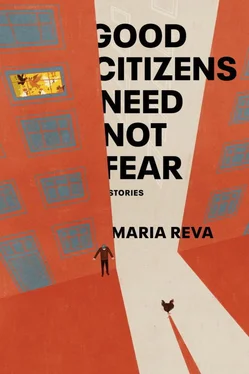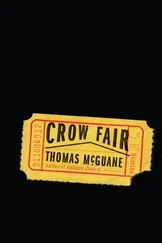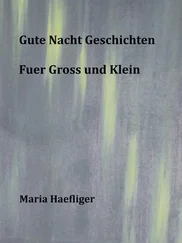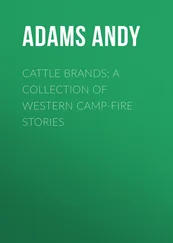Maria Reva - Good Citizens Need Not Fear - Stories
Здесь есть возможность читать онлайн «Maria Reva - Good Citizens Need Not Fear - Stories» весь текст электронной книги совершенно бесплатно (целиком полную версию без сокращений). В некоторых случаях можно слушать аудио, скачать через торрент в формате fb2 и присутствует краткое содержание. Город: New York, Год выпуска: 2020, ISBN: 2020, Издательство: Doubleday, Жанр: Современная проза, humor_satire, на английском языке. Описание произведения, (предисловие) а так же отзывы посетителей доступны на портале библиотеки ЛибКат.
- Название:Good Citizens Need Not Fear: Stories
- Автор:
- Издательство:Doubleday
- Жанр:
- Год:2020
- Город:New York
- ISBN:978-0-38554-529-7
- Рейтинг книги:3 / 5. Голосов: 1
-
Избранное:Добавить в избранное
- Отзывы:
-
Ваша оценка:
- 60
- 1
- 2
- 3
- 4
- 5
Good Citizens Need Not Fear: Stories: краткое содержание, описание и аннотация
Предлагаем к чтению аннотацию, описание, краткое содержание или предисловие (зависит от того, что написал сам автор книги «Good Citizens Need Not Fear: Stories»). Если вы не нашли необходимую информацию о книге — напишите в комментариях, мы постараемся отыскать её.
Good Citizens Need Not Fear: Stories — читать онлайн бесплатно полную книгу (весь текст) целиком
Ниже представлен текст книги, разбитый по страницам. Система сохранения места последней прочитанной страницы, позволяет с удобством читать онлайн бесплатно книгу «Good Citizens Need Not Fear: Stories», без необходимости каждый раз заново искать на чём Вы остановились. Поставьте закладку, и сможете в любой момент перейти на страницу, на которой закончили чтение.
Интервал:
Закладка:
“You must be pleased with yourself.” The Minister’s tone suggested the opposite. “Your counterpart in Kiev was so charmed by your contest, she was about to organize one at the national level—Miss Ukraine SSR.”
“Whatever Kiev is planning, I have nothing to do with it.” Yet Konstantyn couldn’t help chuckling, proud his pageant idea had caught on.
“Kiev is no longer planning,” the Minister corrected. “But next thing we know, it’ll be Miss Estonia SSR. Miss Latvia SSR. Miss Georgia SSR. Miss Chechen-Ingush ASSR.” Konstantyn knew that each of the countries she listed had been the site of recent mass demonstrations, calling for independence.
“And so? You can’t stop them all.” He regretted the words as soon as they tumbled from his mouth, knowing he’d gone too far.
After an awful pause, the Minister’s words were soft, measured: “You’ll make an announcement revoking the girl’s title.”
Konstantyn waited, hoping the Minister would break into laughter. This was the sort of thing the preceding Minister of Culture was rumored to have done: pretend to bestow punishment, then tease his victim for being so easily duped.
“I understand it’s a difficult time.” The Minister’s speech had regained its false drawl. “When was it your wife left you? Three months ago?”
Three months and six days; how did the Minister know? Konstantyn had come home from work to discover the Kombi gone, along with Milena’s fencing gear and a few items of clothing. Milena’s departure had left him spinning like a leaf blown from its branch; he stopped writing, relegated himself to mundane administrative tasks. Their marriage had never been passionate, but he’d envisioned her always being there, stoic and dependable, like a grandfather clock. Whenever he fell ill, she’d leave a pot of broth on the stove before work, and whatever it lacked in taste it made up for in nutrition. When he wrote a new poem, she was the first to hear him recite it, dutifully setting her book on her lap, even though her eyes might not have left its pages.
“At least, no children to split,” the Minister kept on, in studied sympathy. “No need to prove yourself to anyone, Konstantyn Illych. I’ll have a journalist give you a call. One small correction and you’re done.”
When the phone rang again an hour later—likely the journalist—Konstantyn did not pick up. He would wait this one out. Surely the press and the Minister had more important matters to attend to, and would soon forget about his dethroning statement, his backwater town.
Konstantyn had reverse-engineered the Miss Kirovka pageant from its American equivalent. He’d heard the broadcast of Miss America 1989 on Radio Liberty that autumn, dubbed in Russian. It was the applause that caught his ear: the thunderous volume suggested an audience numbering hundreds, even thousands. All the while his Club’s attendance had been dwindling for years, along with state funding. There was a time when the lectorium would fill for history talks and poetry readings; now the one meager draw of the Kirovka Cultural Club was Viktorina, an arcade game that tested a player’s ability to identify traffic warning signs.
On a sheet of graph paper, Konstantyn had taken note of the Miss America pageant’s key parts: the talent round, the bathing suit round, the gown round. He’d jotted down bits of contestants’ speeches, observing how each sentence inflected upward, toward a bright future. Konstantyn had inferred, from the exclamations of the judges, the geometry of contestants’ bathing suits. As he’d listened, he couldn’t help imagining one of those Yankee county fairs he’d read about, with their livestock breed shows, but pushed this thought from his mind. He hadn’t cared for the banter of the host, who seemed to forget that this was above all a competition, but such details could be tweaked. What was important was the applause. And the admission fee.
As it turned out, Konstantyn was among the many Kirovkavites who had tuned in to Miss America. What was American was countercultural, which made it trendy: Levi’s and Coca-Cola had found their way into Soviet homes; the opening of a McDonald’s in Moscow was less than a year away. So it was that Kirovkavites met the news of their very own pageant with a cautious, tight-lipped excitement. On the morning of the event, contestants of all ages—Konstantyn hadn’t thought to specify an age range—formed a line in front of the Cultural Club, a line modest in length but not in coloration. One middle-aged contestant sported a tweed suit, as though about to deliver a lecture; another contestant, around eleven or twelve, wore her newly starched school pinafore; another shivered in a strapless sequin gown, her wide-eyed toddler chewing the hem. And of course, there was Orynko Bondar, who opted for full folk: embroidered blouse, sheepskin vest, poppy-red skirt and boots, a headdress of wheat stalks that stuck out like sunbeams. The contestants shot embarrassed glances at one another to determine which of them had misinterpreted the dress code.
When the contestants’ friends and relatives began showing up—not just from Kirovka but from the surrounding towns and villages—Konstantyn had begun to feel hopeful. His event would be well attended, his Cultural Club once again the center of activity. A beauty pageant would hardly be the pinnacle of the Club’s achievements, but Konstantyn had to be patient. Poetry camps don’t organize or fund themselves overnight.
On the Wednesday morning after the Minister’s call came a special All Union First Radio program announcement. The same nasal voice that intoned Party proceedings and member passings informed Citizens that in eight weeks, in celebration of the mighty Union, an unprecedented event would take place: a Miss USSR beauty competition. Young women from every republic—aged sixteen to eighteen, in good moral standing—were invited to Moscow to take part, and the legitimate winner would be crowned at the Yuon Palace of Culture.
In his office, Konstantyn listened in disbelief. A legitimate winner. An unprecedented event. Either Konstantyn and his town—his country, even—were being punished, or attendance numbers at Moscow’s many Palaces of Culture had been lagging, too. He was incensed that Irina Glebovna was both crushing the legitimacy of his pageant and copying it. True, he had copied it himself, from the Americans, who had probably copied it from the Europeans, but he had elevated the pageant to a more palatable level by enlisting a philosopher, a painter, a novelist, and an astronomer as judges.
Normally he would have laughed off the injustice, feeling above the government’s antics; over dinner he would have regaled Milena with his droning impression of the radio announcer. But without Milena, without an audience, to laugh now felt pathetic, akin to drinking alone.
Konstantyn turned off the radio. The Cultural Club grew silent save for the shuffling footsteps in the hallway outside his office, then the jingle of a fifteen-kopek coin being pumped into Viktorina. He didn’t want to imagine what would happen if the arcade game broke.
The phone rang again.
This time, Konstantyn picked up. It was the journalist, a bored-sounding woman with a smoker’s rasp, still looking for that statement about Olga Bondar.
“Orynko Bondar,” he corrected.
“Sure,” the journalist said, clearly unhappy to have been assigned a story about some yokel town with ethnically named residents.
Konstantyn loosened the scarf around his neck, feeling hot. “Not only will Miss Kirovka be keeping her title,” he heard himself declare, “but she’ll be competing in the Miss USSR pageant.” A dizzying array of possibilities opened within him. Yes, Miss Kirovka would go to Moscow. She would not be silenced. Finally he and his town would take pride in something other than the canning combine or the rumored silo under the sunflower fields. “Watch out for Orynko Bondar, representing Ukraine,” he proclaimed, voice rising. “She will win over an entire empire.”
Читать дальшеИнтервал:
Закладка:
Похожие книги на «Good Citizens Need Not Fear: Stories»
Представляем Вашему вниманию похожие книги на «Good Citizens Need Not Fear: Stories» списком для выбора. Мы отобрали схожую по названию и смыслу литературу в надежде предоставить читателям больше вариантов отыскать новые, интересные, ещё непрочитанные произведения.
Обсуждение, отзывы о книге «Good Citizens Need Not Fear: Stories» и просто собственные мнения читателей. Оставьте ваши комментарии, напишите, что Вы думаете о произведении, его смысле или главных героях. Укажите что конкретно понравилось, а что нет, и почему Вы так считаете.












